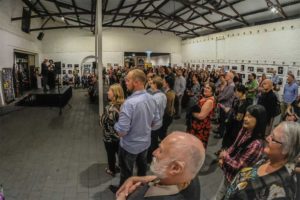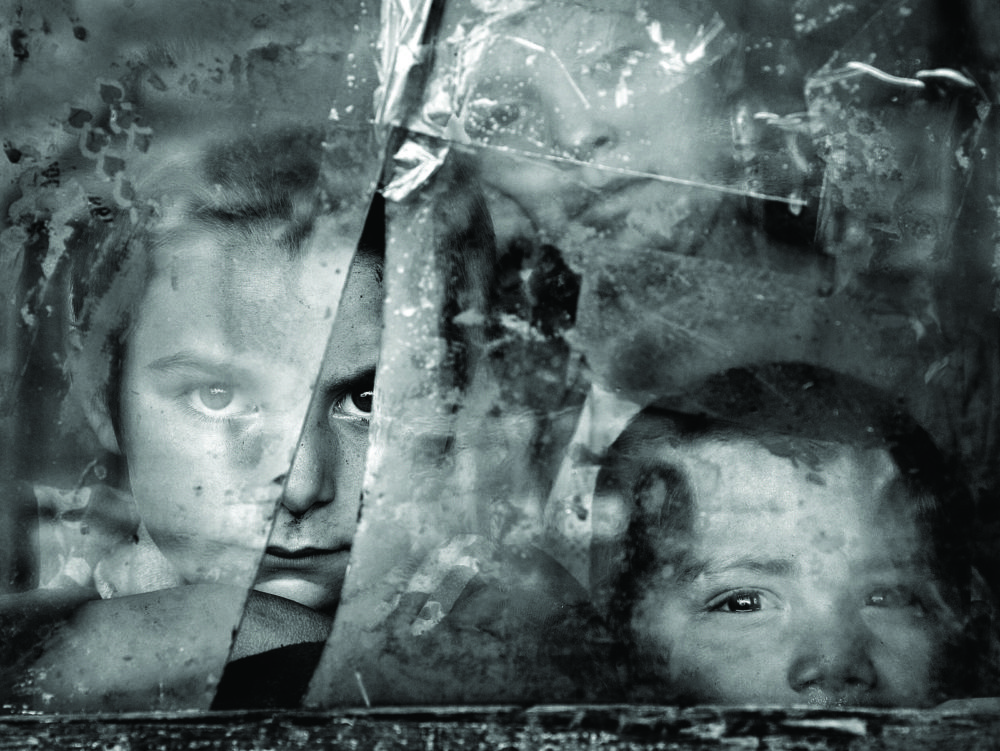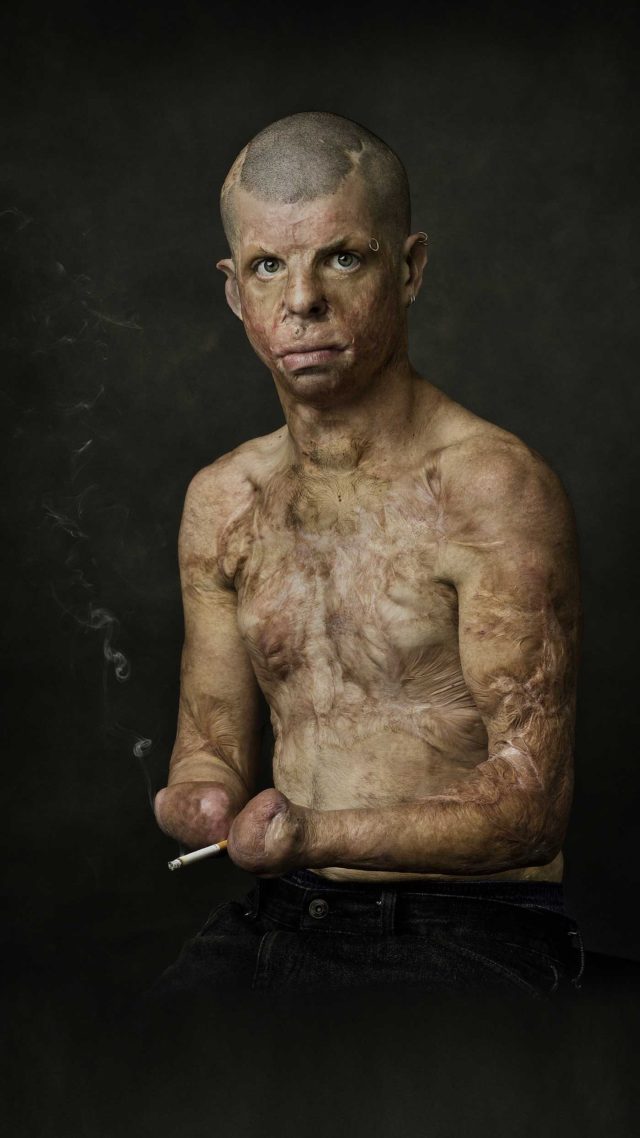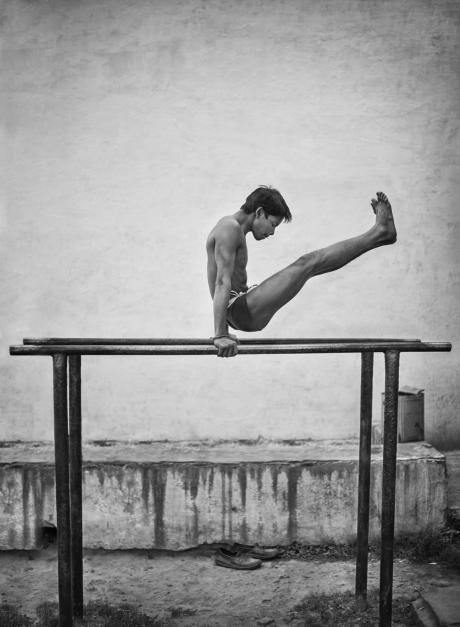Organisers of the Fremantle International Portrait Prize (FIPP) never anticipated that after four contests they would have awarded $40,000 in cash and prizes, and donated over $55,000 to charity.

FIPP has grown into a ‘beautiful monster’, as founder Dale Neill puts it to Inside Imaging: a ‘truly non-profit’ homegrown biennial photography prize that’s run ethically by volunteers, with all excess funds donated to charity.

FIPP culminates in an exhibition at Moores Contemporary Art Gallery in Fremantle.
But there was initial uncertainty if Western Australia, the country’s most isolated state, could pull together a prestigious photo prize in an already crowded awards space. For Dale, an AIPP Master Photographer and leading photo educator from South Fremantle, it came as a challenge.
“Culturally sterile”
‘About a decade ago I was at a photography conference in Melbourne,’ Dale said. ‘Around the bar one night I mentioned how there’s the Moran (Contemporary Photographic Prize), Head On Portrait Prize, AIPP’s APPA, and the National Photographic Portrait Prize. But there’s nothing in WA, and I might have a crack at getting something going. An East Coaster commented that “you’ll never get something going over there. West Australians are culturally sterile”. I thought to myself, gee that’s like red rag to a bull.’
It stuck in Dale’s mind on the long flight back to Perth. He mentioned it to his friend, photographer Sandy Chaney, who returned a couple weeks later with a committee of eight people.
The committee, amateurs and hobbyists with top credentials in fields such as medicine and science, envisaged FIPP as open to all photographers and backed by a strong ethical framework. This resulted in policies such as never extending deadlines, through to fine-tuning a complex yet robust judging system.
But before this could eventuate, there was an issue of money. The committee approached Arthritis & Osteoporosis WA with the concept of a portrait prize that donates excess funds to charity, and the charity agreed to underwrite the first two contests – whether they were a roaring success or absolute failure.
FIPP, originally named FPP, first ran in 2012 and attracted around 600 entries – a small but Ok start. The following year the ‘International’ was added to FPP and the entries skyrocketed to 1760.
‘We’re not marketing specialists. Everyone is genuine and generous in their efforts. What we did was tap into the photographic world through camera clubs.’
With around 200 camera clubs across the country, the FIPP team divvied them into states and promoted the contest through to each club. The boost in entries provided enough money to pay back Arthritis WA and gain financial independence. Arthritis WA remains the organisation FIPP supports, and this year the Kai Eardley Foundation, a charity involved with youth mental health, is also on board.
‘Having been involved in photography all my life, it gives you a pretty damn good feeling to be running a contest that’s just about great photography and giving money to charity,’ Dale said. ‘None of the volunteers or committee members have ever been paid a cent. When we started we had no idea how it was going to go. Not from one competition to the next. We only keep enough to run the next contest and logistics like the website. All other funds are passed on to charities.’
The team also targeted camera clubs on a global scale to garner international entries.

‘I am delighted it’s truly an international competition. Two of the four winners have been from outside Australia – one from Hungary and another from Croatia,’ Dale said. ‘Although the majority of entries, about 75 percent, come from Australia. And I’d say of them maybe 40 percent are West Australians. We’d like to see more entries from interstate and international photographers.’
The prize embodies a generous communitarian esprit de corps that seems characteristic of the WA photo industry. It’s different to some well-funded contests, which recruit the expertise of a single academic art curator, and appear driven to make an edgy and bold statement through their judgements, rather than simply rewarding a great or powerful photograph.

WA doin’ it for themselves
‘Nikon has sponsored the event since the beginning. They’re great supporters. The City of Fremantle provides Moores Contemporary Art Gallery for a few weeks, which is also a valuable contribution.
‘And Paul Maietta from Fitzgerald Photo Imaging prints all the finalist images free of charge. The value of his sponsorship is probably worth tens of thousands!’
FIPP additionally receives local industry support from WA supplier and gallery, Team Digital, Perth’s Camera Electronic, and Freo Camera House. Previous FIPP exhibitions also regularly tour WA, with FIPP 2017 recently showing at Albany’s Museum of the Great Southern
This year the Portrait Prize winner receives $8000 cash, generated from previous year’s entries. Four highly-commended finalists also win $500. Nikon Australia provides a $6000 voucher exclusive to an Australian photographer. Another local runner-up receives a $4000 Nikon voucher. It’s the biggest prize pool yet.

The Mobile Phone/Tablet category winner receives $1000, with $500 for the runner-up.
‘FIPP is one of the very few competitions that’s open to everybody, and as far as I’m aware we’re the only organisation in Western Australia and maybe one of the few in Australia actually raising money from overseas countries for a local charity. Most fundraising is done within Australia to an overseas charity. We’re doing it in reverse, and that’s fairly unusual I think.’
A ‘fair’ judging system
With a background in psychology and statistics, Dale noticed accidental bias has crept into photo contest judging. While no system is perfect, he believes there are flaws when photographers from an organisation judge their peers, communicate and essentially persuade each other, use a numerical system – and seem to hand out more gold awards after the sugar rush of a tea and coffee break!
With that in mind, Dale thinks FIPP’s unique judging system is as fair as humanely possible when it comes to an artistic, subjective area.
The four Portrait Prize judges are provided entries on a USB stick along with eight folders. The first top 20 preferences go in Folder A, the next 20 in Folder B, and so on. A ‘mathematical system’, or algorithm as tech-types call them nowadays, analyses the folders to produce a list based on judges’ preferences.
‘To get up you need to be judged highly by one judge and have some support from a second judge. The judges, who haven’t spoken to anybody else and are doing it independently, aren’t always photographers either.’
The judges then meet and go through the top 100 to come up with a list of 10. They then discuss, argue or debate – from an hour to half a day – to decide the winners.
Dale adds the judges aren’t given a criteria as to how they should make assessments.
‘I want them to use their experience in life without us trying to bend or how they should perceive an image,’ he said. ‘That being said, when we have the exhibition, I don’t think I’ve found anybody that comes in and agrees with the judges! That’s photography and there’s nothing wrong with that.
‘To be honest, I think the people entering are having a bit of fun, as are the judges and the committee – even though we’re working to the bone.’
As for the cheeky Melbourne photographer calling those in the West ‘culturally sterile’, Dale says he’s been forgiven.
The fifth Femantle International Portrait Prize is now open for entries until July 5, with a total prize pool of $21,500.





Be First to Comment